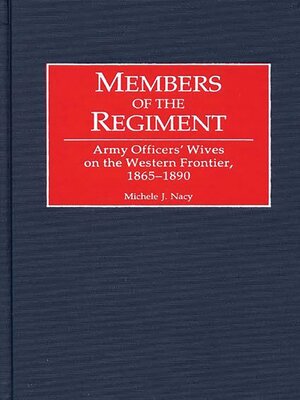Members of the Regiment
ebook ∣ Army Officers' Wives on the Western Frontier, 1865-1890 · Contributions in American History
By Michele Nacy

Sign up to save your library
With an OverDrive account, you can save your favorite libraries for at-a-glance information about availability. Find out more about OverDrive accounts.
Find this title in Libby, the library reading app by OverDrive.



Search for a digital library with this title
Title found at these libraries:
| Library Name | Distance |
|---|---|
| Loading... |
Many extraordinary women traveled west with their Army officer husbands between 1865 and 1890 and discovered a world that was completely controlled by the United States Army. The Army as a public institution colored virtually every aspect of their domestic lives. Army directives, customs, and traditions imposed social obligations on these women, and the world of the frontier Army garrison continually challenged their sense of what it meant to be true women. Remarkably, they flourished and established a defined role for themselves that went beyond the conventional definition of true womanhood.
The shared values, loyalties, and patriotism within the institutional environment of the frontier garrison transcended gender. As distinctly masculine as the Army garrison was perceived to be, the officers' wives shared with their comrades in arms an unequivocal commitment to the Regiment. Because of their presence, the frontier garrison became a much different place to live, as they subtly and slowly changed the very nature of the institution through their efforts to bring some notion of proper society to these rugged circumstances. Unlike most studies, which focus only on farm and frontier women, this volume details the experiences of the women who viewed the world from within garrison walls.
The shared values, loyalties, and patriotism within the institutional environment of the frontier garrison transcended gender. As distinctly masculine as the Army garrison was perceived to be, the officers' wives shared with their comrades in arms an unequivocal commitment to the Regiment. Because of their presence, the frontier garrison became a much different place to live, as they subtly and slowly changed the very nature of the institution through their efforts to bring some notion of proper society to these rugged circumstances. Unlike most studies, which focus only on farm and frontier women, this volume details the experiences of the women who viewed the world from within garrison walls.







